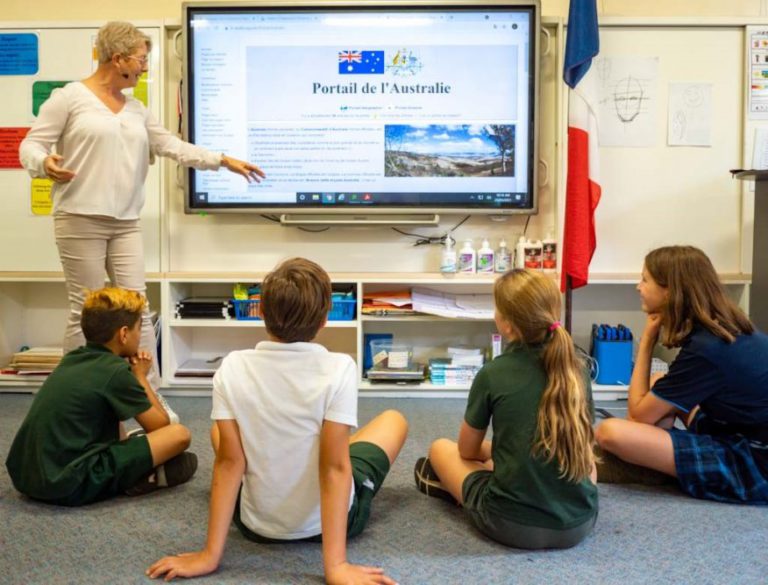Raising bilingual kids…when you’re not a native speaker of the other language.
I grew up in Australia in an English-speaking family, and I’ve only spoken French to my 2 young kids, all the time, every day, since they were born. This may seem like a strange thing to do. I don’t have French parents or grandparents, and I only started learning French when I was 12 years old in high school. I didn’t grow up learning French games, songs, culture, history or geography. Yet together with my husband I’m creating this life for my kids, to help them be fully bilingual. What began as a bit of an experiment has developed into a life-long process that affects many of our choices as a family. I believe it’s possible to introduce and maintain a foreign language to your kids if you have the right strategies and support in place.
- First of all…why do it?
Why speak a language to your kids when it isn’t your mother tongue? Why do we as parents do a lot of things for our kids? To help them grow and mature into young people with opportunities in life.
My Australian husband and I decided to raise our kids as bilingual with French and English always being spoken in our home. He only speaks English with them, and I only speak French. When I was pregnant with our first son 11 years ago, we discussed the idea of speaking 2 languages in our family. We both thought it would be a great gift for our kids. I’m a French-English translator, and I studied French at high school and university, then lived in France for a year. I’ve been teaching French to adults since 2009, and I’m also a teacher of EFL, so I have a lot of experience in language learning and teaching. My husband, by his own admission, did pretty badly at high school French – like most teenagers he didn’t see the point in learning it.
As a teacher, I know how hard language learning is for adults. As a mother, I’ve experienced first-hand the wonder of little kids easily learning 2 sets of vocabulary and grammar and not even questioning it. It’s easier for kids, so for us it made sense to give it a go.
- Isn’t it weird to speak with your child in your non-native language?
It is definitely a bit strange at first, speaking with your child in a language that’s not your mother tongue. It’s called mother tongue for a reason – it’s the language you know by heart because you learnt to talk in this language, and your whole world is shaped around it. Learning to speak a language is not just about learning the grammar rules and pronunciation – there’s also the cultural aspect of a language and its speakers. I had to learn things like French lullabies or popular slang for baby and kids vocabulary as my children grew.
Using emotional language, like when you’re angry or upset, is a lot harder when it’s not your mother tongue. I sometimes mix up verbs when I’m telling my kids off, and of course they like to point these mistakes out to me!
- So how do you actually start?
THE METHOD – My husband and I researched bilingual methods before our son was born. We decided to follow the OPOL method – One Person One Language. There are other ways of raising bilingual kids, some people like to use one language exclusively at home, and the other language when they go out. We thought the OPOL method would work best for us and would cause the least confusion for our child in terms of learning to speak simultaneously in 2 languages. I think it’s important for parents to discuss the method before they start, and to agree on how they will do the language learning aspect of child raising.
WIDER FAMILY & FRIENDS – Our kids’ grandparents only speak English, and they are all very involved in our kids’ lives. This made for a slightly uncomfortable situation at first, as I was pretty much excluding them from conversations with my baby. When the boys were very young and not yet verbal, I sometimes used to repeat myself in English to explain to the grandparents what I’d just said in French. If it was important to the conversation and situation, like what time my baby needed to be put down for a nap as I was going out, then of course I used English with my parents or in laws. But I would always say it first in French to my son.
It also felt a bit weird around my friends who didn’t speak French, when we hung out as new mums with our babies, and I spoke French to my baby. But they all understood why I was doing this, and again if the information was important and concerned them then I would say it in English as well.
Over time – my eldest is 11 years old now – I’ve become much less self-conscious about speaking a foreign language in front of people who can’t understand it. I think it also depends on the community you live in, as there are some very multicultural places where it’s quite normal to hear various languages being spoken – and then there are some very monocultural places too. If you’re in one of these places then you will stand out more, when speaking a foreign language to your kids.
YOUR PARTNER – I’ve talked to people who speak a second language but haven’t passed it on to their kids because their partner doesn’t understand the language. I think this is unfortunate, but I understand how it could create friction in a family. My husband now has a fairly good level of French, which is a big advantage for our family, as he knows what the kids and I are talking about and so doesn’t feel excluded from the family conversations in French.
5 things that worked for our family, especially when our kids were young:
- Be consistent! This was some of the most helpful advice that I read when researching how to raise bilingual kids. It’s hard to consistently speak in one language with your child, especially when the language you’re using is not your first language. It wasn’t natural for me to speak French to my son when he was younger. It felt strange, although over time it became less so, to the point that 11 years later I would now feel awkward speaking English to my kids. Being consistent means you will reinforce the language to your child as they develop their language skills and learn common words and phrases.
- Don’t acknowledge your child when they speak the other language to you. I know, this sounds really harsh! Ignoring your child when they are just telling you something using the other language? Note here that it’s not the ‘wrong’ language, and I never used those kind of words to describe English. My husband and I have always reinforced it as ‘French is what you use to talk with mum and English is what you use to talk with dad.’ When my son was really young and just learning to repeat sounds and words, I would teach him the words in French, while at the same time my husband would give him the English word. Now, it wasn’t always the case that my husband was with us in the room, as I was the primary care giver and he worked a full time job away from the home. So it was natural that our son picked up more French than English in his early childhood, given he spent most of his time during the week with me, his French speaking mum. His English language skills didn’t suffer as he still had time over the weekend with his dad, and he also spent regular time at my parents’ house from the age of 18 months to 3.5 years. When I talk about not acknowledging your child in a certain language, the way it worked in our house was that if my son (and I use him as the example because he’s the first born) asked me something in English, I would reply in French and re-phrase what he had just said and then give him the words he needed to reply to me in French. Kids learn pretty quickly; they have younger, more efficient brain cells than adults, so they also retain new language.
- Make the most of all the resources available to you. We are so lucky to live in the internet age – I can’t even imagine how I would have attempted this bilingual experiment if there was no YouTube and online translation tools. I introduced my kids to French ‘comptines’ (nursery rhymes and songs) when they were a few months old. I found a great playlist on YouTube and we listened to these songs on repeat. When my eldest son was 1, I bought an annual French kids books subscription, delivered to my house each month. Living in Australia, it’s not easy to buy foreign language books, so you will have to pay a bit more for delivery than say someone living in the US or Europe. Finally, find their favourite TV shows in their second language. When my boys were younger and had a regular quiet time after lunch, they got to watch Netflix. I made sure it was a show that had French available as a dubbed language, so the deal was the boys could watch TV but it had to be in French.
- Join a language-specific playgroup with other parents who speak your foreign language. When my eldest son was 13 months old, we joined a Francophone playgroup. For the first year or so this weekly group was more helpful for me as it meant I could have French conversations with other adults. We were living in Perth, Western Australia, at the time, and while there is a small Francophone community it’s not easy to just find French speakers to hang out with! By joining this group, my son heard other French speakers so had more exposure to different accents, and we both added to our repertoire of ‘comptines’. And there was an extensive ‘bibliothèque’, a library of French books that members could borrow. This was my lifesaver as the local public library had few, if any, kids books in French.
- Find a French preschool and/or a bilingual program at a primary school. This is obviously easier if you live in a capital city, and more of a challenge if you’re in regional areas. Our eldest son attended a ‘maternelle’ (French preschool) from the age of 2.5, and now both our boys go to a bilingual public school where part of the curriculum is taught in French.
For more from Cathlin and to get in contact head to her webiste or connect on LinkedIn.
https://barrettlanguageservices.com/
https://www.linkedin.com/in/cathlin-barrett-0444a9228/





